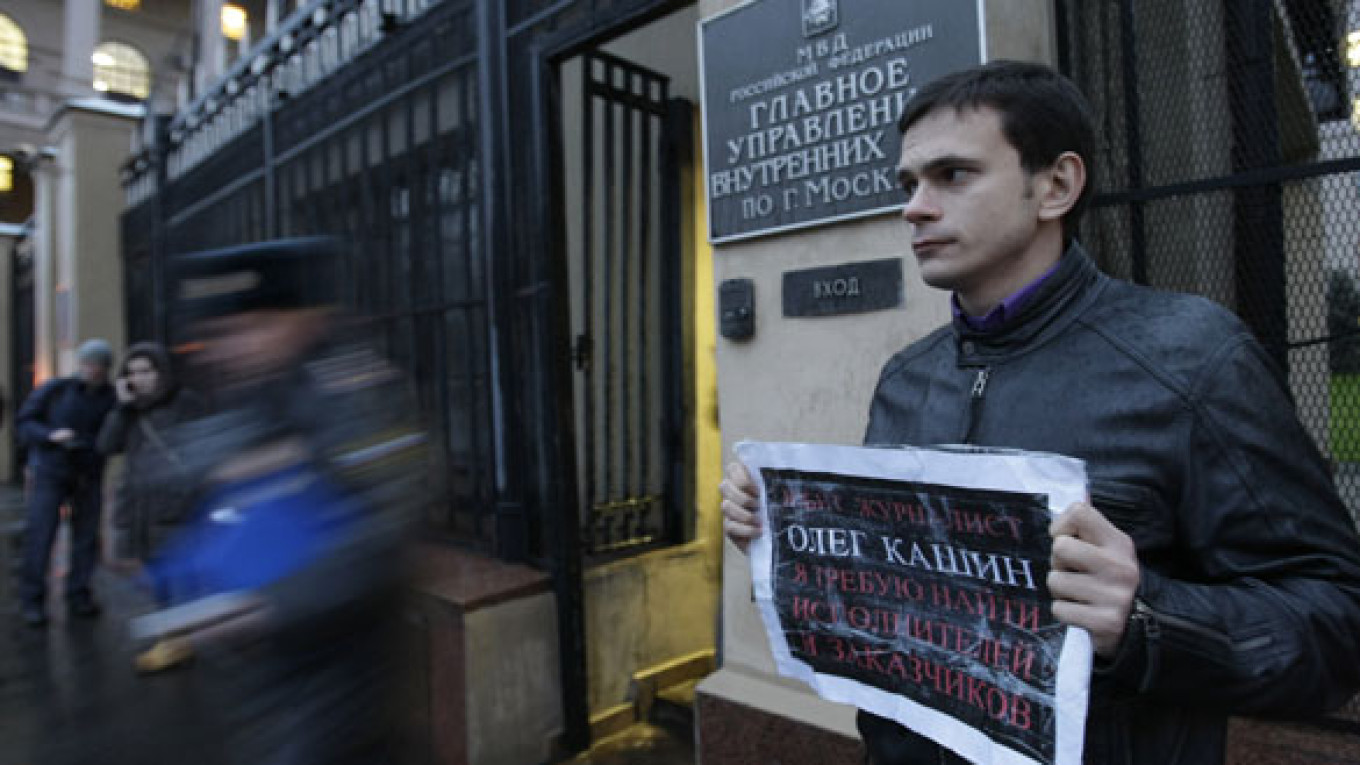The brutal beating of Kommersant journalist Oleg Kashin has outraged the professional community and human rights activists.
They have appealed to President Dmitry Medvedev for an investigation into the Kashin crime, as well as the hundreds of unsolved crimes against journalists over the past 15 years. The goal is to force the authorities to enforce Article 144 of the Criminal Code, which makes it a crime to obstruct the professional activity of a journalist.
The authors of the appeal point out that the cases of the murders of Vladislav Listyev, former head of ORT television, the precursor to Channel One, and Novaya Gazeta journalist Anna Politkovskaya, as well as the 2008 savage beating of Khimki journalist Mikhail Beketov have not been solved. In this year alone, eight journalists were killed and 40 were attacked.
The president already responded by ordering Prosecutor General Yury Chaika and Interior Minister Rashid Nurgaliyev to take personal control of the investigation. This has been done in many similar cases, but, unfortunately, these efforts have led nowhere. Nonetheless, we hope that with the order coming directly from the president, a timely and thorough investigation will be conducted and the people who ordered and executed the attack on Kashin will get the punishment they deserve.
The Russian media have never achieved the status of Fourth Estate as it exists in democratic countries. The government — and to a lesser degree society as a whole — are at fault for the fact that journalists hold so little influence in society. Since the bulk of the most influential media is controlled by the government, this prevents the development of a competitive market for independent media. In addition, the government places legal and judicial barriers to investigative journalism, such as the loosely worded law against extremism that is applied selectively against opposition newspapers and used to limit journalists’ activities.
In September, for example, Moscow’s Tagansky District Court ruled that the Federal Mass Media Inspection Service had grounds to issue a warning to opposition newspaper Novaya Gazeta for “spreading fascist propaganda” after it published a story on Russia’s ultranationalist groups that included quotes from these groups. (After two warnings from the agency, a newspaper can be shut down.) Novaya Gazeta is appealing the decision.
Ideally, the mass media is a means for society to monitor and control itself — including the authorities and the business community. But in Russia, that system of controls is ineffective. Freedom of speech exists, but the media has no influence as a democratic institution that can provide checks and balances against government abuse. Media reports rarely lead to convictions in high-profile cases involving contract killings and corruption.
What they do lead to, however, is the murder and beatings of the authors of the reports. But does it matter for a judiciary that doesn’t bother to investigate cold-blooded murders and ruthless beatings and that almost never brings the perpetrators to justice? Either the government is intentionally concealing the identity of the offenders, or else the system itself is so ineffective that it cannot control its own actions, much less those of the criminals.
The letter of appeal to the president and one-person demonstrations in front of the Interior Ministry are important steps, but they are not enough. The influence and standing of Russia’s virtually nonexistent Fourth Estate would increase if it were to conduct joint investigations into the most important issues, simultaneously publish its findings and coordinate lobbying efforts for better legislation.
Like scattered soldiers on the battlefield, it is time they unite against a common enemy.
This comment appeared as an editorial in Vedomosti.
A Message from The Moscow Times:
Dear readers,
We are facing unprecedented challenges. Russia's Prosecutor General's Office has designated The Moscow Times as an "undesirable" organization, criminalizing our work and putting our staff at risk of prosecution. This follows our earlier unjust labeling as a "foreign agent."
These actions are direct attempts to silence independent journalism in Russia. The authorities claim our work "discredits the decisions of the Russian leadership." We see things differently: we strive to provide accurate, unbiased reporting on Russia.
We, the journalists of The Moscow Times, refuse to be silenced. But to continue our work, we need your help.
Your support, no matter how small, makes a world of difference. If you can, please support us monthly starting from just $2. It's quick to set up, and every contribution makes a significant impact.
By supporting The Moscow Times, you're defending open, independent journalism in the face of repression. Thank you for standing with us.
Remind me later.


